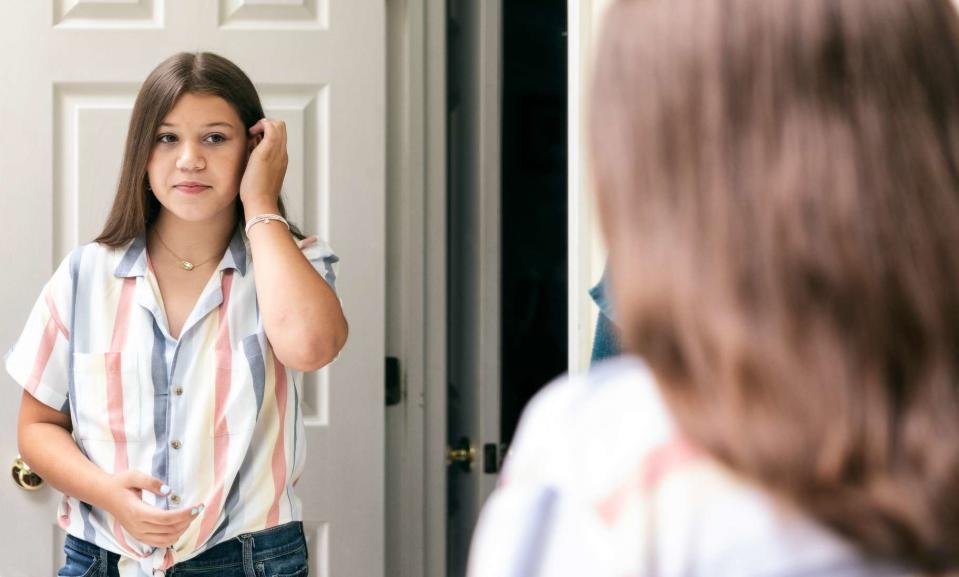What 'Lucky Girl Syndrome' Is and What It Means for Kids
"Lucky girl syndrome" is trending on TikTok. But mental health care providers suggest a different approach.

Sean Locke / Stocksy
Move over, vision boards. Like Millennials' beloved skinny jeans, they've been upended by a Gen Z alternative that promises results as big as the now-trending, Hailey Bieber-backed baggy jeans. The name—and accompanying trending TikTok hashtag—is "lucky girl syndrome."
"Lucky girl syndrome [refers] to the belief that you are the luckiest girl in the world and that the universe is conspiring in your favor," says Jeanette Lorandini, LCSW, founder of Suffolk DBT. "It is when somebody believes that everything will go their way just because the belief they are lucky attracts good things."
Related:
Think positive affirmation meets manifestation. "You will be more likely to notice opportunities that will take you to your goal," swears one TikToker, Emilie Leyes, who says she does hypnosis and "brain training" for actors in a video with more than one million views.
"The secret is to assume and believe it before the concrete proof shows up," says another TikToker, Laura Galebe. She says she's gotten so many opportunities since buying into "lucky girl syndrome."
But the idea has its critics. One mental health provider calls it "self-improvement's version of a get-rich-quick-scheme," though she understands why it's trending. "Magical thinking has always been popular," says Kimberly Vered Shashoua, LCSW, a therapist for teens and their families. "It makes us feel like we're in control of our lives. Gen Z is constantly exposed to bad news, from layoffs to political conflicts to the student loan crisis. It makes sense that they'd be drawn to something that would make them feel a greater sense of agency and control."
Parents aren't immune to the slew of negative headlines and may be tempted to try it themselves— or they may have a Gen Z teen leaning into the TikTok trend. But experts advise proceeding with caution, as the trend can invalidate feelings and lean into toxic positivity.
Here's what parents should know and why some experts suggest looking into a different type of therapy called dialectical behavior therapy instead.
Related:
The Pros of "Lucky Girl Syndrome"
Mental healthcare providers concede "lucky girl syndrome" has some benefits. "Positive affirmations and mantras are helpful for self-esteem building in accomplishing the goals and dreams one may have in life," says Lee Philips, EdD, LCSW, a psychotherapist and certified couples therapist.
Lorandini says believing "all good things will come" can give people a confidence boost that helps them tackle challenges—and build connections with people of a similar mindset.
"The way we think has a powerful influence on our health and well-being, and having a sense of optimism—a mix of positive thinking, goal-driven behavior, and confidence—can go a long way," Lorandini says.
Related:
The Cons of "Lucky Girl Syndrome"
Experts caution against making "lucky girl syndrome" a blueprint for their lives. Shashoua says it has multiple downsides, notably combining toxic positivity and victim blaming.
"People [might] feel like they weren't affirming themselves enough, or even that their negative thoughts caused bad luck," Shashoua says. "[They may think] 'If I assume my good luck is caused by my thoughts, what causes my bad luck? Obviously, also my thoughts.'"
What's more, it may invalidate non-affirming feelings. "Coping is about a balance," Dr. Lee says. "Feeling our emotions such as anger can be healthy. We can learn from them, and process them in a way that can be calming and soothing through a series of using emotional regulation and distress tolerance skill building."
Related:
A Different Approach: Dialectic Behavioral Therapy
Mental healthcare providers understand people are looking for a way to take control of their thoughts and bring positivity into their lives. Another approach, Dialectic Behavioral Therapy (DBT), may provide a solution for parents that balances mindfulness and mindset shifts without minimizing feelings.
"Dialectical behavior therapy [is a] type of therapy that combines mindfulness, self-reflection, and taking action," Shashoua says. "It helps people deal with stress and pick actions that bring them closer to their goals."
Shashoua says parents of neurodivergent teens have seen it help patients manage stress and anxiety. "Many of the neurodivergent teens I work with face unique sources of distress, such as sensory overload and restlessness," Shashoua says. "DBT helps us check in with our body, calm our nervous system, and identify ways to minimize our stress."
Related:
Lorandini says parents can use the principles of DBT when communicating with their children using the "GIVE" approach.
G: Be gentle in how you communicate.
I: Act interested in what they are saying.
V: Be validating. "This doesn't mean agreeing with what they are saying at all times but validating their emotions and needs at this time. For example, 'I see that you are upset' or 'I realize this is frustrating for you,'" Lorandini says.
E: Keep an easy and approachable manner. Keep it light-hearted.
Dr. Lee says parents can even apply the principles to their own emotional regulation—allowing them to find genuine silver linings after processing emotions. "As the saying goes, you gotta feel it to heal it, so be gentle with yourself and try to stay as non-judgmental as possible about your feelings," says Dr. Lee. "Often, our triggers give us an opportunity to do some more grieving or to heal some things from the past that need to be dealt with."
Ultimately, it's about finding an approach that works for you—one that's authentic. "We need to find approaches grounded in realism, not pessimism or forced optimism," Shashoua says. "[Try] an affirmation like, 'I can get through today," 'I am learning to accept myself,' or 'All I can control is how hard I try, and today I'm going to try my best.'"
Related:

